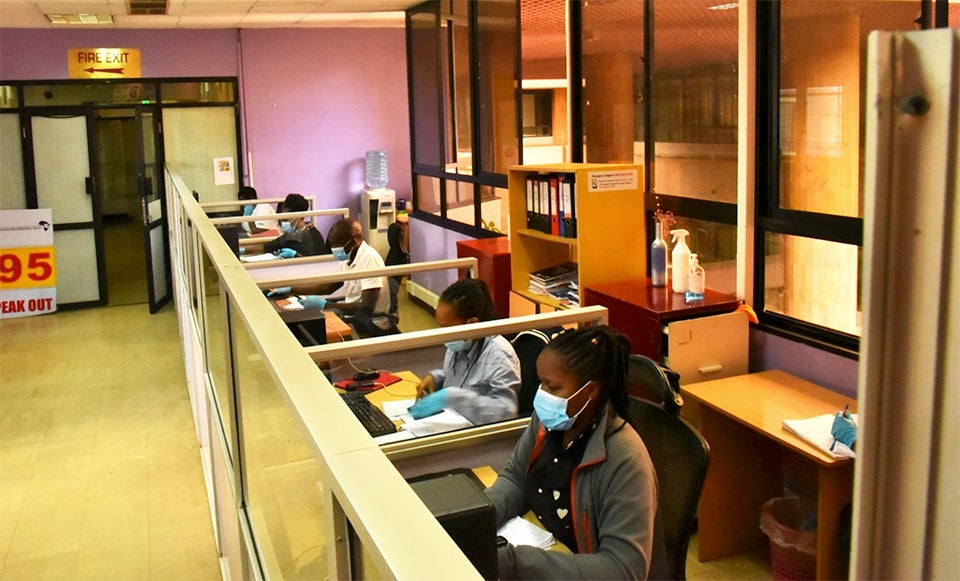COVID-19: UN Women Supports Kenya's National Helpline for Survivors of Sexual and Gender-Based Violence
Date:

(All names are pseudonyms to maintain confidentiality)
The Nairobi-based helpline is a free-to-call service, setup to give immediate assistance to the public in the event of all forms of sexual and gender-based violence (SGBV). The helpline operates 24-7 and is taking more calls than ever. As cases of SGBV and violence against child (VAC) surge globally, Health Assistance Kenya (HAK1195) is one of Kenya’s primary frontline response services to the ‘shadow pandemic’. For the months of March, April and May, the helpline’s recorded cases rose from 115, 461, to 753, respectively.
In emergencies, this often means coordinating an ambulance or directing law enforcement to the scene. “They said had the survivor been waiting 30 more minutes, she would not be here today,” explains Maria Ngugi, a new recruit, who arrived at the beginning of the pandemic. The team have a direct line to local police and health headquarters across the country which often places them at the centre of many cases.
A large part of the service is dedicated to psychosocial support, via tele counselling, to assist survivors manage traumatic experiences. All HAK responders are trained counsellors foremost, with many offering expertise on a volunteer basis as the demands of COVID-19 require a bigger support network. This month’s case load consisted largely of psychological torture, physical assault, rape, and defilement; 67% of which – experienced by women and girls.
Suicide is common. Maria explains that “violence, particularly prolonged violence, has damaging effects on an individual – they may report a case in 2014; they call again in 2015; 2016 it happens again. People want to give up, they feel that nothing can be done. We receive a lot of calls from people wanting to commit suicide.”
However, HAK’s commitment to survivors stretches beyond emergency response and counselling. They also track the progress of cases through the court system. This is crucial given the complexities inherent in obtaining justice for survivors and low conviction rates. And although resilience is a prerequisite, it is not always an easy job. Paul Chego has worked for HAK since 2018 and admits that, while you have to leave your work in the office, some things can be difficult to accept:
“Defilement cases which you cannot follow up are the hardest to deal with. Imagine a child has been defiled; the case comes to you. But the caller reporting on behalf of the child (usually a family member) changes their phone number – it becomes near impossible. Sometimes even the family disappears. That is why it is so important that cases get reported and there is an OB number [reference number].”
SGBV remains one of Kenya’s biggest human rights challenges – 45% of women aged between 18 -45 have experienced some form of sexual or gender based violence. Yet the coordination role HAK plays, linking survivors with health and law enforcement is evidence that more must be done to raise awareness about what SGBV is and what is in place to help.
“We notice a spike [in calls] when there’s been a HAK radio announcement,” explains Paul, a clear indication that people are still searching for help or simply information. “We try and help our survivors by educating them. Many do not understand their rights. You find that many are illiterate. Some hold on to traditional cultural beliefs which causes challenges. It’s about letting these people know we have health care facilities; we have a justice system to protect them.”
The onset of COVID-19 is contributing to a spike in cases, but it also affects working life for the team. “When it hits 4pm – you go running!” explains Maria. With movement restrictions in Nairobi County, and a severely limited local transport service, there is pressure to get home before curfew takes effect. While the day’s cases are left in the office, home presents challenges of its own – increased exposure to the outside world creates anxiety and fear for the whole household.
HAK’s national reach and immense responsibility sits in the hands of a small, dedicated group of tireless professionals. The team increased in response to COVID-19 from 18 to 30 counsellors, with the help of UN Women funding. The increased capacity is saving more lives, supporting more survivors and their families through recovery, and increasing access to justice. COVID-19 may well provide HAK with an opportunity to justify further expansion to its service.